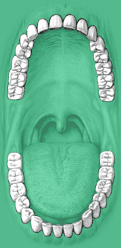First an initial diagnosis is carried out, an impression and wax bite are made to determine proper jaw position. Then, the dentist will try it in the patient’s mouth to assure proper color, shape and fit. Only after these steps the final denture is fitted. Advantages of using dentures are improved chewing ability, speech and support for facial muscles whilst enhancing facial appearance and smile, making you more confident and happier. Book your appointment today for a beautiful smile.
Cleaning:
Removable partial or full dentures require proper denture care to keep them clean, free from stains and looking their best. For good denture care:
- Remove and rinse dentures after eating. Run water over your dentures to remove food debris and other loose particles. You may want to place a towel on the counter or in the sink so that the dentures won't break if you drop them.
- Clean your mouth after removing your dentures. Use a soft-bristled toothbrush on natural teeth and gauze or a soft toothbrush to clean your tongue and palate.
- Scrub your dentures at least daily. Gently scrub your dentures using a denture cleaner, mild soap or dishwashing liquid and a denture brush or soft toothbrush to remove food, plaque and other deposits. Avoid stiff-bristled brushes, strong cleansers and harsh toothpaste, as these are too abrasive and can damage your dentures. Toothpastes advertised as whitening pastes are especially abrasive and should be avoided with removable dentures.
- Handle your dentures carefully. Be sure you don't bend or damage the plastic or the clasps when cleaning.
- Soak dentures overnight. Most types of dentures need to remain moist to keep their shape. Place the dentures in water or a mild denture-soaking solution overnight. Don't soak dentures with metal attachments in solutions that contain chlorine because it can tarnish the metal. Check with your dentist about properly storing your dentures overnight.
- Rinse dentures before putting them back in your mouth, especially if using a denture-soaking solution. These solutions can contain harmful chemicals that cause vomiting, pain or burns if swallowed.
- Schedule regular dental checkups. Your dentist will advise you about how often to visit to have your dentures examined and professionally cleaned. Your dentist can help ensure a proper fit to prevent slippage and discomfort. See your dentist promptly if your dentures become loose. Loose dentures can cause irritation, sores and infection.
Overdenture
An overdenture is similar to a conventional denture except it has precision dental attachments underneath that give it much better retention. Overdentures can be made to fit over implants or in some cases over natural teeth. It is a way of providing extra stability for dentures so that they behave much in the same way as natural teeth, and patients can be confident that they won’t move around or fall out, alleviating the need to use messy adhesives. It’s an ideal solution for anyone who has a lot of trouble keeping dentures in place due to lack of retention, and the overdentures can be removed for easy cleaning.
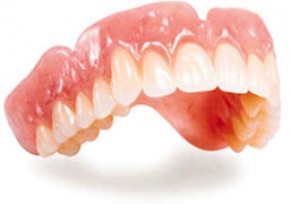
If natural teeth are left in place then they are likely to be cut off at the gum line with the stumps covered by filling material or cast metal copings which help protect them from decay. The reason for leaving these teeth in place is that the roots of the teeth help maintain the bone in the jaw; if there aren’t any teeth left in the jaw then the bone will gradually reabsorb which makes it increasingly difficult to keep dentures in place. Having these roots in place also gives extra support to the denture and increases the stability.
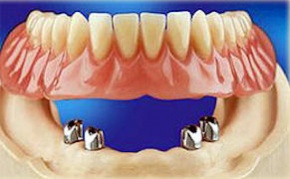
The most secure way of supporting an overdenture is using implants, and a full denture can be made to have separate attachments or a bar attachment underneath which will lock onto implants attachments in the jaw and feel completely secure. A full denture will need to have several implants to lock onto, with more implants being required in the upper jaw as the bone is softer.
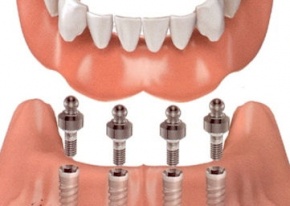
The process of having dental implants takes several months to complete, and it’s essential that the jaw has adequate bone mass density to hold the implant securely in place. The implant is made from titanium as this is an element which integrates extremely well with natural bone. Once the implant has been screwed into the jaw bone it has to be left to heal for several months. When the implant has healed it can be uncovered and a post or abutment attached, and this can then support an attachment on an overdenture.
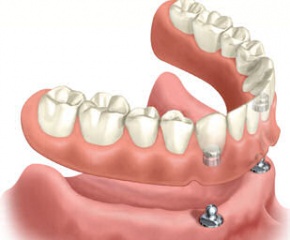
Overdentures are especially good for people who have trouble keeping lower dentures in place as the lower jaw is particularly susceptible to bone reabsorption. They also enable upper dentures to be constructed in the shape of the arch instead of covering the whole of the hard palate. Some people find having the hard palate covered extremely uncomfortable as it can stimulate the gag reflex, and cutting away this portion of a normal denture makes it much less retentive.
Having an overdenture made to fit over implants may seem quite expensive but the results are extremely good. It is considerably less expensive than having a bridge made to fit over implants to replace a full arch of missing teeth.
Overdenture: What Is the Expected Life and When Will I Need to Replace It?
The life of an overdenture and the implants can depend on several factors, but implants can last a lifetime with current studies showing them lasting 20 years or more. Factors which may affect the life of implants include general oral hygiene habits, overall health and other habits such as teeth grinding and smoking. It’s possible that parts of the implant may have to be replaced periodically due to wear and tear or deterioration. It also depends as to whether the overdenture is for the upper or lower jaw, and how many implants it is supported by.
The bone in the upper jaw tends to be much softer than the lower jaw, and there is frequently insufficient bone density around the area of the molars are so implants tend to be placed towards the front the mouth. The general view is that six implants are necessary for good stability and long-term success, as this helps distribute the load much more evenly. However these are only guidelines and some people have had good success with just four implants.
Maintaining your overdenture and implants
All implants must be well maintained as it’s important to remember that they are integrated into the bone. This means that care needs to be taken to avoid any infection or inflammation around all of the implants as this may cause the surrounding bone to reabsorb which could eventually cause the implants to become loose.
The chances of this situation occurring can be lessened by ensuring regular checkups with your dentist, and also by cleaning the overdenture and the implants thoroughly each day. This should involve flossing around the implants and using special interdental brushes or an angled brush to get them properly clean.
Advantages and disadvantages of overdentures
In general the life expectancy of an overdenture is pretty good, and although the process is quite complicated the benefits far outweigh the cost and time involved. This is because overdentures are very stable and feel more like natural teeth than ordinary dentures. They are also more retentive and help preserve the remaining bone. There is less pressure on the alveolar ridge than with conventional dentures and patients generally feel a lot more confident and can enjoy better health through being able to have better nutrition.
These types of dentures are more expensive than ordinary dentures, and require much more maintenance. At first the overdenture may feel more bulky than a conventional denture although this feeling should quickly pass. The importance of good oral hygiene cannot be stressed enough with this type of denture as cleaning is a lot more fiddly and time-consuming.

